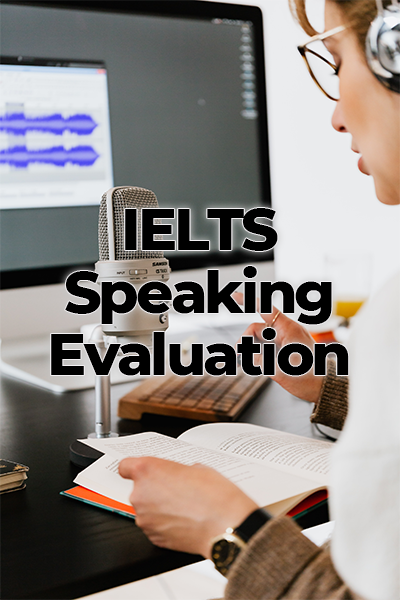If you’re looking for some information about the IELTS speaking test grading criteria and IELTS speaking evaluation, then you’re in the right place. We’re going to give you the rundown on the four categories that are evaluated, including Fluency & Coherence, Lexical Resources (Vocabulary), Grammatical Range & Accuracy, and Pronunciation.

IELTS Speaking Evaluation
List of IELTS Speaking Marks Criteria
Check out the basic list of IELTS Speaking marks list criteria and continue reading to learn more details for each one.
- Fluency and coherence
- Lexical resources (vocabulary)
- Grammatical range and accuracy
- Pronunciation
IELTS Speaking Band Descriptors
How do we know the IELTS Speaking marks criteria? It is from the examiner’s marking criteria sheet called the band descriptors. This sheet is used to evaluate your IELTS Speaking performance. You can download the original PDF file provided by the official IELTS website.

IELTS Speaking Band Descriptors
Understanding the Speaking Band Descriptors
If you looked at the IELTS band descriptors image or the original pdf file, you might have noticed that each criterion is graded for 9 different band scores. However, the terms are pretty technical, so it can be confusing to understand what the examiner is really looking for from you. If that’s the case, see the next section to learn what is required for each criterion.
- Amazon Kindle Edition
- Bolen, Jackie (Author)
- English (Publication Language)
- 286 Pages - 04/06/2023 (Publication Date)
IELTS Speaking Evaluation Criteria
The IELTS speaking evaluation is done based on four criteria.
#1: Fluency and coherence
One of the most important criteria for IELTS speaking evaluation is fluency and coherence. How quickly you speak, without pauses or repeating yourself. Is the previous thought connected to the next one, and how do you finish off what you’re saying?
#2: Lexical resources (vocabulary)
To score at the band 7 level, or above, you’ll need to be able to speak about all the topics on the test with precision, as well as useful things like collocations (words that occur together more often than by random chance), idioms, slang, and phrasal verbs. This book will focus on helping you with this!
- Amazon Kindle Edition
- Bolen, Jackie (Author)
- English (Publication Language)
- 114 Pages - 07/05/2021 (Publication Date)
#3: Grammatical range and accuracy
To score at the highest levels, you’ll need to be able to form a variety of simple and complex sentences accurately. The keys are to use a variety of sentence types and to make few errors.
#4: Pronunciation
You’ll need to be able to be understood very easily, without any effort on the part of the examiner. Plus, you’ll have to put emphasis on the correct words within a sentence and also within a longer speaking turn. To score at the highest levels in this section, don’t be afraid to show your personality and have a bit of fun with the test!
Now that you know the IELTS speaking evaluation criteria, do you want to master the test? Have a look here at some common topics and questions: IELTS speaking part 1 and IELTS speaking part 2 topics. Also, be sure to have a look at IELTS speaking part 3 questions with answers.
How Difficult is it to Score Band 9 on the IELTS Speaking Test?
It’s quite difficult (though not impossible) for non-native English speakers to achieve a band 9 on the IELTS speaking test. There are people who have been learning English as a second language (most Europeans for example) since they were young children, and they also have a first language that is similar to English. For these people, it may be achievable.
Or, some people who moved to an English-speaking country when they were young may be able to get this score. Or, those who did a large part of their education in English.
Of course, you may be stronger on IELTS listening as opposed to speaking, or your reading is better than writing. Overcome this by focusing on your areas of weakness.
- Amazon Kindle Edition
- Bolen, Jackie (Author)
- English (Publication Language)
- 90 Pages - 08/26/2021 (Publication Date)
IELTS Speaking Evaluation: How to get a Band 9 Score
However, being a native English speaker doesn’t automatically mean that you’ll be able to get a 9. It’s not that easy to do! To do that, you’ll also need to do the following:
- Develop topics fully and at length.
- Connect thoughts, without repetition.
- Only have pauses that are related to forming an opinion about something and not searching for a word (no pauses in the middle of sentences).
- Use a large range of very precise language, including things like idioms.
- Speak fluently, essentially without grammatical errors.
- Be understood easily, without any effort on the part of the examiner.
- Avoid the use of filler words (this is what even native speakers may struggle with).
You Probably Don’t Need a Band 9 Grade!
The good news is that there is almost no reason why someone would need to get a 9 on this test. For educational, immigration, employment, or other purposes, I don’t know of any of them that would require getting a 9! So, don’t worry about it. Scoring a 7 or 8 on the speaking test is a far more achievable goal and should be acceptable in almost all cases.
Even native English speakers may struggle to get a 9 for a listening band score or an IELTS reading band score as it’s very easy to miss a question or two.
- Amazon Kindle Edition
- Bolen, Jackie (Author)
- English (Publication Language)
- 114 Pages - 07/05/2021 (Publication Date)
IDP IELTS vs British Council IELTS
A common question that people have is whether or not the test is easier at any particular test center, including IDP or the British Council. In reality, the test, as well as the grading is exactly the same, no matter where you take it. Find out more:

Speaking Evaluation IELTS
IELTS Speaking Evaluation FAQs
There are a number of common questions that people have about grading a speaking exam. Here are the answers to some of the most common ones.
How do you score a speaking test?
You can score a speaking test by using a rubric. For example, the IELTS speaking test is graded equally among the following four categories: Fluency & Coherence, Vocabulary, Grammar, and Pronunciation.
How can I get an 8.5 in IELTS speaking?
In order to get an 8.5 in IELTS speaking, you will need to be close to fluent in English. It’s almost impossible to get this high of score unless you’re already proficient in English speaking. Beyond that, study the test format and practice speaking exams to get familiar with the test.
Is 6.5 a good score in IELTS speaking?
6.5 is a good score in IELTS speaking, and it means that you’re reasonably proficient at talking about both familiar/personal topics and unfamiliar/general ones. This score is often good enough for entrance into many educational institutions, for immigration or employment purposes.
What is the lowest score in IELTS speaking?
The lowest score in IELTS speaking is 0, which means that the person said nothing. A score of 1 is someone who says words, but they don’t have any meaning. A 2 is given to someone who may answer some of the questions with 1-2 word answers.
Is IELTS difficult to pass?
IELTS isn’t a test that you “pass” or “fail.” It’s graded from 0 to 9, with band 9 being the highest score (totally fluent).
Is IELTS Speaking test grading done immediately?
The IELTS speaking test grading is done immediately by your examiner. However, they are not allowed to tell you your score immediately, and you’ll have to wait a few days to find out your official results.
How can I sound like a native English speaker?
What are band descriptors in IELTS Speaking?
The speaking band descriptor is a marking criteria sheet that the examiner uses to grade your speaking performance. You can find the public version of the band descriptor on the IELTS official website.
IELTS Speaking Band Score: How is it Calculated?
Do you know how IELTS speaking evaluation works? Each of the four categories (fluency/cohesion, pronunciation, lexical resources, grammatical range and accuracy) are given a score from 0-9. Each section has equal weighting and is averaged out to the nearest o.5.
IELTS Speaking Band Score Calculation #1
F+C= 5
P= 6
LR= 5
GR= 7
Average= 5.75
Band score = 6 (rounded up to the nearest 0.5)
IELTS Speaking Band Calculation #2
F+C= 2
P= 3
LR= 3
GR= 4
Average = 3
Band score = 3
Learn More About IELTS Speaking Grading
Watch the video and learn how IELTS Speaking grading works and how you can improve:

IELTS Speaking Evaluation Criteria
IELTS Speaking Evaluation: Join the Conversation
Do you have any questions about how this speaking exam is evaluated? Or, some IELTS speaking test tips? Leave a comment below and let us know. We’d love to hear from you.
You might also be interested in this: English Self-Introduction.
Last update on 2025-04-09 / Affiliate links / Images from Amazon Product Advertising API








Leave a Reply